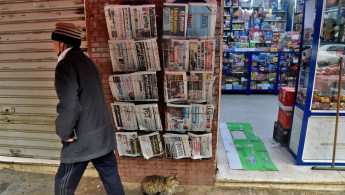Despite his release, Algerian journalist Ihsane El-Kadi has little hope in the future of Algeria's press
Algeria released 18 prisoners of conscience under a presidential pardon, signalling what could be a turning point in the country's crackdown on freedom of speech and press. But, some of the journalists and activists who were freed in that pardon remain doubtful.
"We can't call this a new beginning, as over 250 political detainees still languish in Algerian prisons," Ihsane El-Kadi, one of those released on 1 November, said to The New Arab from Algiers, Algeria.
El-Kadi, a prominent journalist and owner of media company Interface Médias, was sentenced in January 2023 to five years in prison for allegedly receiving foreign funds to destabilise the state.
He was freed alongside several other detainees connected to the pro-democracy Hirak movement. Their release coincided with the 70th anniversary of Algeria's independence war—an occasion typically marked by presidential amnesties.
"The night of my release was filled with emotional turmoil," recalls El-Kadi. "We had hoped for an amnesty for all political detainees, but we were disappointed."
For months, activists both in Algeria and abroad campaigned for his release. His Radio channel M, known for its critical views of the current regime, was dissolved by the state, and its assets seized.
While grateful for the support, El-Kadi insists that his case is part of a larger pattern of repression in the North African country.
"My case is just one of over 250 others", he says, pointing to other journalists and activists imprisoned for speaking out.
"The international support for my case embarrassed the state in international forums, but those without such attention remain in prison."
El-Kadi's release came alongside two other journalists—Omar Ferhat, director of Algeria Scoop, and Sofiane Ghirous, editor-in-chief—and nine other prisoners of conscience, including young poet Mohamed Tadjadit.
'Worse era than under Bouteflika'
In 2019, the Hirak movement erupted, calling for the removal of the political elite amid a failing economy and the military's influence. The movement was brutally suppressed, leading to the arrest of its leaders and a low-turnout election that brought Abdelmadjid Tebboune, who promised stability.
In June 2021, Tebboune amended the penal code, redefining "terrorism" to include calls for regime change or challenges to national unity.
That same year, activist Hakim Debbazi died in police custody after sharing pro-Hirak posts, and the Algerian League for the Defense of Human Rights (LADDH) was dissolved, with its leaders fleeing abroad to avoid prosecution under the new law.
Since then, with under an expanded definition of terrorism, hundreds of activists, journalists, and Hirak supporters have been arrested. As of November 2023, El-Kadi estimates that 250 to 300 people remain in prison on politically motivated charges.
"We're now in an era that is worse than the one under Bouteflika, worse than the 'dark decade' of the 1990s," El-Kadi argues. "Back then, journalists were killed, but we still spoke out. Now, people practice self-censorship to keep their jobs and to avoid jail."
A state-controlled body, the National Publishing and Advertising Agency (ANEP), decides which outlets receive advertising revenue.
Journalists critical of the government have reported being denied funding. Additionally, several draft laws have severely restricted foreign funding for media, leading to the closure of multiple outlets due to financial difficulties.
In 2022, the independent French-language newspaper Liberté, in operation for over 30 years, shut down citing financial struggles. The paper's owner, Issaad Rebbrab, an outspoken critic of the regime, was sentenced to prison for "forgery."
Upon his reelection in September, President Tebboune promised dialogue with the opposition parties "in consecration of true democracy."
However, El-Kadi and others see little hope in President Tebboune's pledges, though, determined to keep pushing for a free press in Algeria.
"We're working on relaunching Radio M and will continue the struggle," El-Kadi told TNA.




 Follow the Middle East's top stories in English at The New Arab on Google News
Follow the Middle East's top stories in English at The New Arab on Google News
![A group of Palestinians, foreign and Israeli activists gather to participated in an olive picking event on the land in the town of Battir, which is under threat of confiscation by Israel in Bethlehem, occupied West Bank on 8 November 2024. [Getty]](/sites/default/files/styles/image_330x185/public/2182930803.jpeg?h=199d8c1f&itok=__0LgGsa)

![People gathered around the rubble of destroyed houses to search for survivors [Getty]](/sites/default/files/styles/image_330x185/public/2024-11/GettyImages-2184733820.jpg?h=199d8c1f&itok=NiM1LO2f)